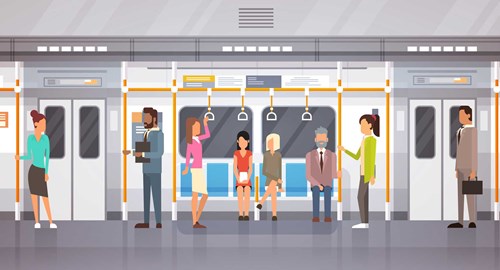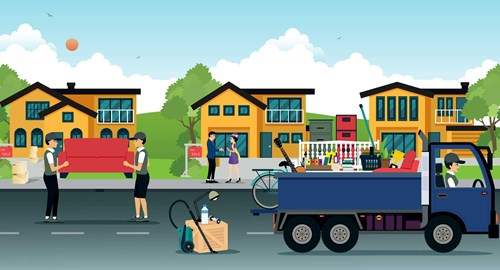Transport Options in Bangkok

Moving to Thailand means seeing the city through a resident's eyes, and thus a different perspective. For expats moving into Thailand's capital of Bangkok, this means questions about whether rumors about the city's traffic situation is true, and the reliability of the public transport system options.
Would getting around Bangkok be easier and cheaper with a car? Getting to know the Bangkok transport system means learning how to navigate its dizzying network of highways, roads, numerous sois (side streets) and troks (alleys).
Airports: The Gateway to Thailand
Bangkok's reputation as one of the top tourist destinations in the world is as strong as ever. Tourism is one of the city's economic drivers, and the capital city serves as the gateway to the rest of Thailand.
The Bangkok International Airport, known as Suvarnabhumi, is one of Asia's busiest transport hubs, with over 64 million passenger traffic in 2018. Thai Airways is Thailand's award-winning flag carrier and operates out of Suvarnabhumi. Don Mueang Airport, which was the former international airport, reopened to accommodate domestic flights in 2007 and has since resumed international flights mostly by low-cost carriers.
Chiang Mai, one of the most visited provinces in Northern Thailand, also has its own international airport. The Chiang Mai International Airport operates flights to and from destinations like Hong Kong, Seoul, Kuala Lumpur, Singapore, and as far as Doha.
Take the Road: Buses, Taxis and Tuktuks
Bangkok is continuously expanding. As more people move into the city, its road infrastructure and public transport system are struggling to keep, resulting in congestion
One thing that expats have to get used to when relocating to the city is that the streets and roads are much more narrow – and yes, the stories about Bangkok traffic jams are absolutely true. There's also the growing problem of air pollution that poses health risks to its residents. Despite these problems, Bangkok is one of the most liveable cities in the world, climbing to the 89th spot in ECA International's Liveability Survey for 2019.
The most basic public transport options available used by residents and tourists alike are the public buses, the majority of which operate under the Bangkok Mass Transit Authority (BMTA). Aside from buses, the BMTA also operates minibusses, vans, and songthaews, which are passenger vehicles adapted from pick-ups or large trucks. Buses operate within the Greater Bangkok area, and there are separate bus services that provide transport to all provinces in Thailand from Bangkok.
While buses are cheaper than the Skytrain, they're more liable to get stuck in the city's notorious traffic jams. Those that offer the lowest fares are not always air-conditioned, which makes for a very uncomfortable ride in the prevailing humid climate. Minivans and minibusses provide a link to the suburbs outside of Central Bangkok, where there are also a sizable number of expat communities.
Car taxis are also available but aren't exactly cheap and can get stuck in traffic as well. It's not unusual to see passengers hopping out of taxis stuck in the street, and simply walking to their destination if it's a short distance.
The other taxi variants are the motorcycle taxis, and the tuk-tuks, which are motorized tricycles. Motorbike taxis have their own regulated ranks, and fares are usually fixed or negotiable. With tuk-tuks, one will have to bargain with the tuk-tuk drivers for a mutually acceptable fare to your destinations.
Go By Water: Boat Services
Commuting by boat is quite popular in Bangkok, due to the traffic gridlock. These boat services are used by tourists and residents alike, with different types of boats offering different services.
For the most part, these watercraft navigate Chao Phraya River, the major river in Thailand. The most popular boat service is operated by the Chao Phraya Express Boat Company, with fares costing around THB 10 depending on how long is the journey. Unlike other road transport options, these water taxis can stop wherever you want, and pass by the Grand Palace, Wat Arun, and the Royal Barge Museum.
Take to the Sky: BTS and the MRT
The development of the country's rapid transit and rail systems was the response to the growing problem of traffic in many of the major cities in Thailand such as Bangkok. The BTS Skytrain, Thailand's first rapid transit system, began operating in 1999, and the underground Metropolitan Rapid Transport (MRT) opened in 2004. The Bangkok Airport Rail Link started running in 2010.
Trains in Thailand service the entire country via several long-distance railway lines, all operated by the State Railway of Thailand (SRT). Hua Lamphong Railway Station serves as the main hub for trains going to Chiang Mai in Northern Thailand, northeast to Nong Khai and Ubon Ratchathani, and east to Aranyaprathet.
BTS Skytrain
The most popular mode of transport is the elevated BTS Skytrain, which currently has two lines. The Sukhumvit line runs south from Mo Chit Station, covering Phahon Yothin Road, Sukhumvit Road to Samrong Station, which is a residential area popular with expatriates. The Silom line goes east from the National Stadium Station, passing Ratchadamri, Si Lo, Narathiwat Ratchanakharin, and Sathon roads, and terminates in the Phasi Charoen district.
The current fleet of BTS trains consists of 52 four-car trains. On average, daily ridership on the Skytrains is around 650,000 to 700,000 and continues to increase as more people move into Bangkok. There are plans to extend both the Sukhumvit and Silom lines, which will add 46 more four-car trains between 2018 and 2021.
To pay the fare, there are BTS stored-value tickets are also known as Rabbit cards, and available in Student, Adult, and Senior versions. Both Student and Senior versions have restrictions on use, and those who wish to purchase these may be asked to show a valid ID. The Senior Rabbit card can only be used by Thai citizens aged 60 and above.
Metropolitan Rapid Transport (MRT)
In contrast to the elevated Skytrain, the MRT operates below ground and primarily serves the Bangkok Metropolitan Region. Currently, there are only two lines consisting of the MRT Blue Line and the MRT Purple Line, with a total of 35 train stations running along 43 kilometers of track.
Compared to the Skytrains, daily ridership on the MRT is more modest with 287,000 passengers recorded in 2017. However, the plans to extend both the Blue and Purple Lines and the addition of four more lines - Orange, Pink, Yellow and Brown Lines – are expected to boost passenger traffic.
Tickets for the MRT come in the form of the MRT Plus card that uses RFID contactless technology and round tokens good for single journeys. The MRT Plus card can be topped up and the fare is calculated depending on distance traveled. There are tickets available for adults, students, children, and senior citizens, with 10 percent off for students and 50 percent discounts children and the elderly. There are plans to create a joint ticketing system so passengers will only need to use one ticket for the MRT and the Skytrain.
The Bangkok Airport Rail Link
From the airport, there are different forms of public transport available to get into the city or to other provinces in Thailand. The Bangkok Airport Rail Link is a commuter rail line that connects Suvarnabhumi Airport to Phaya Thai (BTS) station by way of Makkasan Station (MRT Phetchaburi). The Airport Rail Link is open from 6:00 am to midnight, with trains leaving every 10 minutes during peak hours and every 15 minutes during off-peak times and weekends. Fares range between THB 15 to THB 45 depending on the distance traveled. Visit Bangkok Airport Online for more information.
Driving in Bangkok
While the cost of getting a car in Thailand isn't as prohibitive unlike in Singapore, vehicles still come with high import taxes. Thus, it's not such a big surprise that most expats living in the city choose to take the available transport in Thailand instead of driving a car. Many expat retirees who made the move to other Thai cities or provinces that are less congested end up buying a car to have reliable transport.
If you want to get a car and drive in Bangkok yourself instead of hiring a driver, you can use your international driver's license up to one year only. After that, you need to get a Thai driver's license at the Department of Land Transport (DLT) and submit the needed documents and pay the fee. If you send an authorized representative with a letter, this will incur an additional stamp fee of THB 10. Please note that in Thailand, driving is on the left-hand side of the road.
You need to attend a class on safe driving and take several written and practical tests. Once you pass, the license is good for one year. You can have it renewed for another two years and a further five years after that. For more details about getting a driver's license or renewing it, please visit the Department of Land Transport (DLT).








